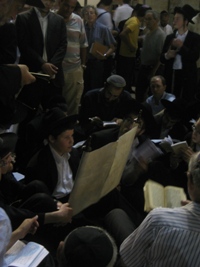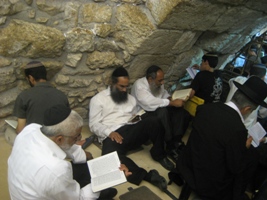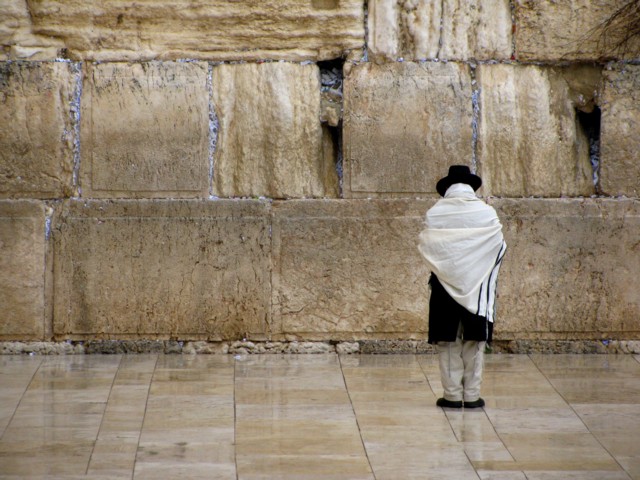“These are the words Moses spoke to all Israel across the Jordan in the wilderness in the Arabah opposite Suph”. These are the opening words of “Devarim” (Hebrew for words) the first Parasha in the Book of Deuteronomy (Called the book of Devarim in Hebrew). I have to say that the exposition is very surprising. Moses was no great speaker, on the contrary: In the Parasha of Shmot we hear him tell God “for I am slow of speech, and of a slow tongue” (Exodus 4:10), But here, we find Moses speaking in front of a huge audience of Israelites. His speech is as long as the book of Deuteronomy, a fifth of the Torah (The five books of Genesis, Exodus, Leviticus, Numbers and Deuteronomy). In light of this radical change in Moses’ behavior, I believe that the first few sentences are of crucial importance. Instead of telling the whole story from the time Jacob and his sons came into Egypt, Moses decided to start his speech from the days in the Desert and the conquering of the Transjordan. Not a very nostalgic approach, is it?
The Parasha of Devarim is all about the conducting of the Israelites in the desert, the sin of the spies who discouraged them, its punishment and the conquering of the Transjordan, but the Shabbat this week is better known for its’ Haftarah (sections from the writings of the prophets, read on Sabbaths after the reading from the Torah). The Shabbat is known as Shabbat Hazon. The Hebrew calendar makes this the last Shabbat before the 9th of Av (The day of fast that commemorates the destruction of both the First and Second Temples in Jerusalem). Theoretically it is only a coincidence, as it seems there is no connection between the conquering of the Transjordan and the destruction of both Temples, or is there? Prof. Yeshayahu Leibowitz thinks otherwise. He argues that the destruction of the Temple is a punishment for a sin just like Isaiah (Yeshayahu) the prophet say in our Haftara:
“The vision concerning Judah and Jerusalem that Isaiah son of Amoz saw during the reigns of Uzziah, Jotham, Ahaz and Hezekiah, kings of Judah. Listen, heavens, and pay attention earth, for the Lord has spoken: I have raised children and brought them up, but they have rebelled against me. The ox knows its owner and the donkey its master’s feeding-trough, but Israel does not know; my people do not understand.” (Isaiah 1:1-3)Those sins that caused the destruction of both temples are common knowledge and Chazal, the Jewish sages, discussed the issue thoroughly. Prof. Leibowitz expands the discussion and makes a connection between Moses’ words from the Parasha “But how can I bear your troubles, burdens and disputes by myself?” (Deuteronomy 1:12) with Isaiah’s words from the Haftara “The faithful city – what an adultress she has become” (Isaiah 1:21) and with the famous opening words of the book of Lamentations “How she sits alone the city crowded with people” (Lamentations 1:1). In his book “Seven years of conversations over the weekly Torah portion” Leibowitz claims that there is a connection between the conducting of the Israelites in the desert, the prophesies of admonishment and destruction of the Temple and the city of Jerusalem. The book of Lamentations is called ‘Eicha’ in Hebrew. The word Eicha means “howcome?” and the repetitive way it is used in the text indicates that the end of story can be predicted by its’ beginning – the sin and its punishment are one. And what was the sin? Leibowitz hints that the real sin is the Israelites’ conquest. Reading this in Leibowitz’s book reveals an implication that goes all the way to our modern times. As for myself, I’m not sure that the writings are that clear about the sin implied by Leibowitz but it is an interesting argument.
After showing a tight connection between the Parasha of “Devarim” and the 9th of Av, it becomes obvious that on the eve of 9th of Av we should visit the Wailing Wall, Known as The Kotel. And what an experience it is! The square in front of the Kotel is packed with tens of thousands of people sitting on the floor and reading from the book of Lamentations. That night you can see Ultra orthodox Jews of all sects sitting alongside Religious Zionists, Traditional religious Jews and even Jewish tourists from all over the world. While some people take photos without bothering anyone, others fall on the floor and pray and just beside them people pass by and take care not to step or trip on them. It is really a moving sight.
The huge crowd that attends the Kotel on the 9th of Av takes part in an ancient tradition. During the time of the Byzantine Empire, Jews were allowed into Jerusalem only on the 9th of Av. They used to go to the Kotel and lament the destruction of the Temple (Hence the name “Wailing wall” that was given to the Kotel). Throughout all periods, Jews gathered near the Kotel whenever they could.
A nice example can be found in the words of Rachel Yanait Ben-Zvi who visited the Kotel in the 9th of Av 1908:
“I have been to the Kotel many times by now, but today it seemed different. The crowds flow, all walking barefoot. They all approach the Kotel silently and solemnly and their footsteps make no sound. A sound of Lamentation is heard. On the floor, people sit in circles and read their lamentations to the light of candles…flocks of women who seem glued to the Wailing Wall weep bitterly. We stood their silent for a long time until we could detach ourselves from the sight.
(Rachel Yanait Ben-Zvi, “Anu Olim”, P.70)
During theses moments at the Kotel on the 9th of the month of Av, many remember Nebuchadnezzar and Titus the destructors of The Temples. I remember Titus as well, Son of Vespasian Caesar and the man who demolished the second Temple. These are grave allegations that made Titus one of the most hated figures in the Jewish history (though I must say he has quite a few rivals trying for this dubious title). Here, near the Kotel on another commemoration day for the destruction of the Temple I want to remind myself the words of Josephus referring the war council called by Titus just before the burning of the Temple. As opposed to the recommendation of his captains of thousands who thought he should burn the Temple for military reasons, Josephus quotes Titus saying:
“although the Jews should get upon that holy house, and fight us thence, yet ought we not to revenge ourselves on things that are inanimate, instead of the men themselves;” and that he was not in any case for burning down so vast a work as that was, because this would be a mischief to the Romans themselves, as it would be an ornament to their government while it continued”(Josephus, The wars of the Jews, book 4, ch.4)
How about that? Titus objected the destruction of the Temple! Even strategic arguments couldn’t change his mind. Josephus, Titus’ personal Historian pictures Titus as a tenderhearted guy who, when heard that the Temple caught fire by accident, “as he (Titus) was resting himself in his tent after the last battle; whereupon he rose up in great haste, and, as he was, ran to the holy house, in order to have a stop put to the fire;”
(Josephus, The wars of the Jews, book 4, ch.4)
Indeed, It is a day of self examination in Jerusalem…


